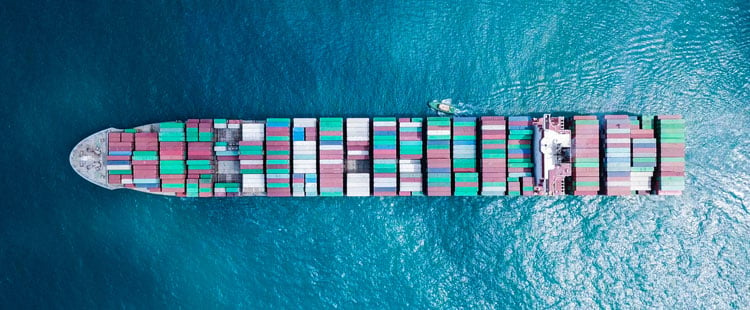
Do you know the difference between Free on Board (FOB) and Free Alongside Ship (FAS)? Or at what point the Delivered at Transfer (DAT) risk shifts from the buyer to the seller?
If you don’t, you’re not alone.
Incoterms are often a point of confusion for sellers and buyers dealing in international trade. It’s not uncommon to find people don’t fully understand what they are, let alone how they’re used to determine who is responsible for costs during the transportation of cargo.
Incoterms is short for “International Commercial Terms.” These terms were drafted by the International Chamber of Commerce in an effort to reduce conflict between international traders and minimize the chance of trade disputes and litigation.
However, many buyers aren’t aware of how to use Incoterms in their deals and could be exposing themselves to higher prices and more risk. It’s important to note that Incoterms are not contracts, but guidelines you can include in your contract and reference when issues arise.
The International Chamber of Commerce won’t step in to mediate for you based on a disagreement or misunderstanding about Incoterms. You still require a strong contract to protect you and your business.
What Incoterms Do and Do Not Cover

Incoterms provide an objective standard for who’s responsible for what under the terms of a contract. This helps alleviate some of the difficulties that naturally occur in international commerce. Different laws, cultures, and business standards don’t always translate.
Incoterms will tell you who bears the cost for each expense incurred from the seller’s warehouse to the buyer’s destination. They will tell you when risk passes from one party to the other and describe when and where delivery occurs. Other elements covered by Incoterms are insurance responsibility and export/import customs obligations, such as duty payments and taxes. They do not, however, transfer the title of goods. That’s accounted for in the contract.
3 Stages of an Import
Every international shipment, whether by air or ocean, includes three basic logistical elements.
Incoterms make it clear who bears the responsibility of both insuring and paying for each of these stages.
1. Pre-Carriage
Regardless of how your cargo gets to its destination, it usually begins the journey at a warehouse. This is the “Pre-Carriage” stage. If you’re shipping by air, your items need to be brought to the airport. If you’re shipping by vessel, your cargo needs to be stuffed into a container at a warehouse and then brought to a port. Of course, this all costs money. Somebody has to pay to get the actual container. Then there’s the cost of getting freight from a warehouse to the airport or ocean port.
2. Main Carriage
Once your cargo has arrived at a port, it’s moved to a ship or plane. We refer to this as the “Main Carriage” stage of the journey. Somebody has to pay for storage, handling, and space on the vehicle. With ocean-bound cargo, somebody has to pay to put your cargo on the boat, likely by crane. Beyond these charges, additional surcharges will pop up along the way. Your agreement must state who is responsible for these costs, and Incoterms help determine that ahead of time.
3. On-Carriage
Once your cargo arrives in the U.S., it begins the “On-Carriage” stage. Incoterms determine who pays to get it off the boat or plane, as well as who is responsible for getting the items through customs and ensuring clearance.
Incoterms break up each of these stages into discrete elements that can be assigned to either the buyer or seller for payment. There are 11 Incoterms that break down costs between the buyer and seller. Under some Incoterms, the shipper might be responsible for loading the goods onto a truck and that’s it; everything else is the buyer’s responsibility. Other Incoterms are more detailed. They include guidance for determining who covers insurance costs, who is responsible for cargo at any given point in time, and what happens in the event that cargo is lost or damaged.
These standards can be difficult to wrap your head around, but they can help protect your business from overwhelming costs resulting from legal disputes, fines, or lost cargo.
Recommended Incoterms
For people importing from Asia to the United States, we recommend buying under Free on Board (FOB) or Free Carrier (FCA) terms.
Both of these Incoterms essentially place the burden of cost on the seller up until it reaches a destination port or another agreed upon destination. This means that the buyer is only responsible for domestic costs.

We advise this because, unless you actually own a business in the country of origin or have local offices with export experience, the logistics and regulations can be difficult to navigate. The last thing you want is to be on the hook for an easily avoided fine in a country you’re trying to do long-term business with. You want the seller to be responsible for any dealings with their customs officials.
A Container of Damaged Goods
Anyone can be a good partner when something goes wrong.
Incoterms are a great method for coming to an understanding with a seller, but they are still just guidelines, and a contract is only as good as your ability to pay to enforce it.
For example, let’s say your container shows up at your dock full of seawater. If you’ve already paid for everything, then you’re sunk. The cost of trying to recover damages from an international partner is likely going to be greater than the cost of whatever goods you lost. This is why it’s so important to work with trusted suppliers and freight forwarding companies. If your cargo shows up and it’s damaged, ruined, or seized by customs, you want to have a competent business partner who can deal with whatever comes down the pike.
Who Needs to Know Incoterms?
Anyone who imports international goods should have some understanding of Incoterms. However, if you’re only going to import something once, then you’re better off working with a vetted freight forwarding partner who can help guide you through the process.
If you’re setting up a new long-term business with ongoing shipments, you should become very familiar with Incoterms as they’ll help you protect your business from unforeseen costs and design deals that serve your margins.
Before you set out to do business with an international provider, know your Incoterms. Talk to experts in the industry about their experience using these standards and which ones they’d recommend for your situation, product, and budget.



